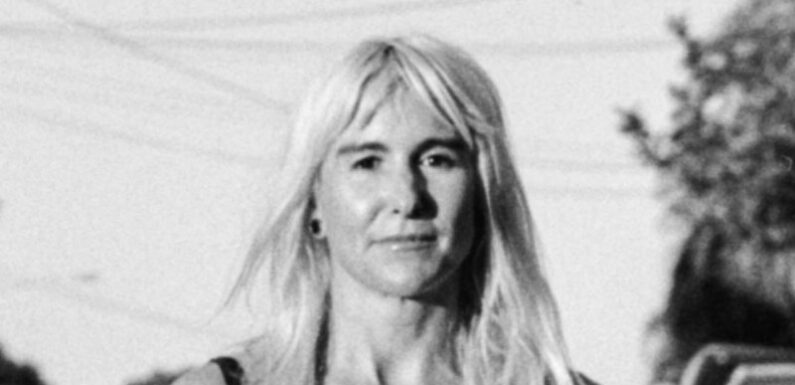
Save articles for later
Add articles to your saved list and come back to them any time.
FICTION
Why We Are Here
Briohny Doyle
Vintage, $32.99
“Instead of writing a funny book about a delightful young protagonist, I write circles around the idea of aftermath.” So muses the narrator of Briohny Doyle’s latest novel – a deeply interior (and, in fact, often funny and delightful) work that takes the reader into the mind of a grieving, isolated woman.
Briohny Doyle and her dog, Baby. Her novel has a strong element of autofiction.Credit: Nash Ferguson
Like Doyle’s previous books, including the 2021 novel Echolalia (exploring motherhood in the face of climate change), and the 2017 non-fiction work Adult Fantasy (melding memoir and cultural criticism to unpack coming of age in the time of neoliberalism), this novel is concerned about the way an individual responds to crises both personal and global.
Doyle is concerned with the way an individual responds to crises.Credit:
In this case, the narrator, BB, has lost her partner and father in an 18-month period, and her loneliness and discombobulation are exacerbated by COVID lockdowns. She moves to Balboa Bay, a beachside suburb of Silver City (Doyle’s version of Sydney), where she finds comfort and companionship in her dog, Baby, and the dogs around her when neighbours mistake her for a dog trainer. The narration of her day-to-day life is interspersed with memories, particularly of her partner, who is referred to with reverential capitalisation, almost like an imagined higher being. So, who is she without Him, and how does she go on?
Credit:
The story becomes increasingly surreal and includes splashes of magic realism as BB and Baby develop telepathic communication, and different sounds, such as a dog whose howl sounds like the wind, give her days their strange colour. Photographs by Nash Ferguson dotted throughout bring BB’s world into a new dimension.
Why We Are Here bears similarities – formal and thematic – to Sigrid Nunez’s 2018 novel, The Friend, which depicts the relationship between an unnamed novelist and a dog after the suicide of her friend, the dog’s original owner. In the tradition of the contemporary literary novel, neither book is especially plot-driven, instead tracing the sometimes contradictory, sometimes repetitive contours of a life impacted by grief and loss, and the healing powers of canine companionship.
Both novels have elements of autofiction, which lends a sense of emotional veracity and weight. Doyle lost her father and partner in real life, and she also published a piece in this masthead in June about the loss of her real-life dog, Baby, which is heavy with the same kind of grief and love that make up so much of this book.
BB is a writer, and her thoughts unfold in an appropriately literary way: Doyle weaves in snippets from the likes of Rebecca Solnit and Sheila Heti, and PA announcements from a neighbouring prison quote scholars and philosophers such as Lauren Berlant and Judith Butler. The latter, in particular, makes the work feel vaguely academic, which may dilute its accessibility or appeal most directly to a niche readership. But there is a cyclical sense of comfort in BB finding solace in the writers who came before her, as a reader might find solace in this novel.
The action outside BB’s mind is largely in the slice-of-life style; interactions with neighbours are often cursory, serving to reveal social truths rather than shine a light on any particular individual characters or their traits. Her entanglements with new love interests Vera and Franz are more insightful, illustrating the challenges of romantic connection following the end of a major relationship. Vera, in particular, is a charming character: a librarian-in-training with strong thoughts about how to rearrange the Dewey decimal system outside the patriarchal and meritocratic gaze.
When nothing and everything happens in a novel, the feeling is a gentle, meandering sense of drift. It can feel directionless, but there’s also a lovely kind of flow, helped by Doyle’s evocative, unhurried prose.
The novel is as much about grief as it is about survival and gratitude, as BB observes: “In the aftermath of Him I’d found the outside world’s ongoingness obnoxious, but I was wrong. External reality may have been cruelly incongruous, but it was still generously there.”
The Booklist is a weekly newsletter for book lovers from books editor Jason Steger. Get it delivered every Friday.
Most Viewed in Culture
From our partners
Source: Read Full Article


